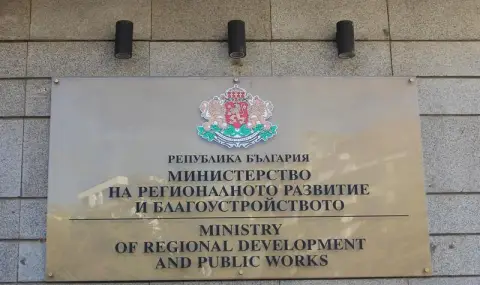We appeal to Pleven and Lovech, as well as all other municipalities in the country, to prioritize water supply facilities under the Investment Program for municipal projects. Given the critical situation, until next Wednesday, November 20, the Municipality of Pleven and Lovech must review and optimize the projects they have proposed for financing from the state budget through the program. This was discussed today at a meeting between the Ministry of Regional Development and Public Works and the Pleven Municipality. It was attended by Deputy Minister Veselina Terziyska, Dr. Valentin Hristov, Mayor of the Pleven Municipality and experts from the departmental directorate of the Ministry of Public Works and Water Resources and the Water and Sewerage Holding. Already last week, the same information was provided to the municipality of Lovech.
During the meeting, the large losses on the water transmission network in the specified areas were commented on. The experts from “Bulgarian Plumbing Holding“ EAD and from MRRB, who also participated in the conversation, are categorical that this is due to the poor condition of the internal water supply network in the settlements, whose owners are the respective municipalities, which are also responsible for their rehabilitation. This is based on an inspection of the water supply network conducted by the Pleven Waterworks. Its results, including data on the most compromised and in need of repair sections, have been provided to the municipality. We remind you that the water supply companies are responsible for the construction of water supply pipelines, and if necessary, carry out emergency repairs of the internal water supply network managed by the municipalities.
At the moment, more than 258 municipalities in the country benefit from the opportunities of the Investment Program for municipal projects and will receive about BGN 800 million for the reconstruction of water supply networks from the total budget of the program, which after the latest amendments amounts to nearly BGN 7 billion. leva. In order to ensure the maximum efficiency of the investment, predictability in the rehabilitation of the water supply infrastructure and to avoid duplication, the MRRD and its structures appeal that the water supply projects financed through the program be agreed with the operators so that they can be upgraded with joint efforts.
Precisely for this reason, once again, as during all the meetings so far with representatives of the local authorities, the appeal was made by the MRRB for prioritizing water supply projects under the program, which is the fastest possible source of investment in such type of infrastructure in the country. It enables the local administrations to quickly solve a large part of the water supply problems in the municipalities, which in the summer months are aggravated due to irrigation, filling of private reservoirs, accidents, amortized water supply network, drought, etc. In addition, this investment by the municipalities has another social aspect that should be taken into account when submitting projects. In contrast to the network improvements carried out by the water supply operators, the service is not calculated in the price, i.e. will not increase the price of water.
The unregulated use of drinking water for non-domestic needs also contributes to deepening the problem, which must be stopped with the cooperation of the local authorities.
In continuation of last week's meeting on the problems with the water supply of various settlements in the country, including Pleven, it was commented today that urgent measures will be taken to ease the water regime for the city of Pleven. It is planned to build a supply water pipeline to feed the shaft wells of the "Bivolare" Water Supply Group. This will increase the amount of water supplied, but will not solve the problem entirely. Together with the municipality, active work will begin to replace the internal water supply network. In this way, losses and accidents will be reduced. In parallel with this, the MoEW will strengthen the monitoring of the water levels in the dams, including the regulatory regime, and priority will be given to water for drinking and household needs. The other important project for guaranteeing the water supply of Northern and North-Eastern Bulgaria is the construction of the “Danube” system.
Providing funds from the state to complete the construction of dams is one of the measures that the working group, formed in compliance with an order of Prime Minister Dimitar Glavchev from July 2024, proposes to deal with the lack of water in the country. In the estimated budget for the period 2025-2028. funds have been proposed to finance surveys, studies, design and construction and installation works on several dams in the country. These are the “Black Eight“ dams. for Pleven and Lovech, “Hristo Smirnenski“, dam. “White“ for Gabrovo, Sevlievo and Dryanovo, as well as the partially constructed dam wall “Kyustendil” and "Sliven" drinking water treatment plant.
In 2025 a dam is about to be put into operation in the Panagyurishte region. “Crazy Yana” and a drinking water treatment plant to it. This is the second drinking water dam to be built in the country in the last 30 years. In 2019 a permit was issued for the use of the "Plovdivtsi" dam; in the area of Rudozem.
Among the other measures proposed by them are the construction of drinking water treatment plants, new water sources, water supply pipes, reservoirs for accumulating and storing water resources, building infrastructure to connect to existing water supply systems, implementing projects related to metering of water quantity and pressure, collection of data on water supply networks in populated areas and assessment of water losses in them, significant reduction of losses both along the water transmission network from the water source to the user, as well as along the hydromelioration network.
